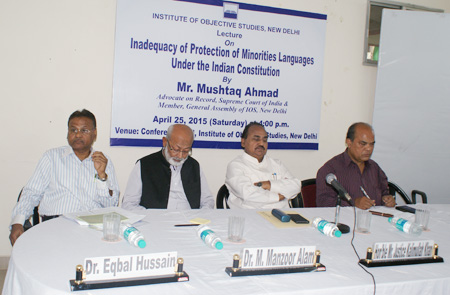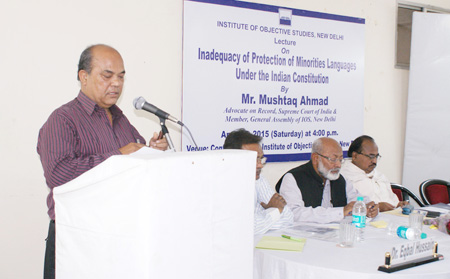By TCN News,
New Delhi: A lecture on “Inadequacy of Protection of Minorities Languages under the Indian Constitution” was delivered by Advocate-on-Record, Supreme Court of India and member, General Assembly of IOS, Mushtaq Ahmed at the Institute of Objective Studies at its conference hall on April 25.
Ahmed insisted that provisions relating to the protection of minorities’ languages in the Constitution of India were express as well as implied. Besides, certain judgments of the Supreme Court had upheld the rights of religious and linguistic minorities. He said that the minorities had been given the right to manage their religious affairs. Hence religious denominations had a right to establish and maintain religious and charitable institutions.

L-R: Dr. Eqbal Hussain, Associate Prof. of Law, Jamia Millia Islamia; Dr. Mohammad Manzoor Alam, Chairman, IOS; Justice Kalimullah Khan, Former Judge, Allahabad High Court; Mr. Mushtaq Ahmed, Advocate-on-Record, Supreme Court of India and member, General Assembly, IOS
He held that Article 29 of the Constitution implicitly referred to the protection of the minorities’ languages by saying that any section that was in a minority could be guaranteed the protection of its distinct language. Describing Article 30 as the conscience of the nation, he said that the minorities whether religious or linguistic, were given the right to set up and administer institutions of their choice. This implied that by virtue of being a linguistic and religious minority, a community could use the language of its choice as medium of instruction. This provision also applied to Urdu as a medium of instruction, he argued.
Ahmed explained that Article 345 indirectly referred to minorities’ languages. Under this Article, read with Article 358, states had been given power to declare Hindi or any other regional language as an official language. He also mentioned the case of Uttar Pradesh where the Hindi Sahitya Sammelan, Allahabad had challenged the government’s decision to declare Urdu as the second official language in the Allahabad High Court.
An appeal against the verdict of the High Court was filed in the Supreme Court, which ruled in favour of the State government last year. Similarly, a case relating to the filling up of the vacancies of Urdu teachers in Delhi hanging fire since 1995 was finally decided by a Delhi Court recently. Instead of being seized of the problem of constantly depleting number of Urdu teachers, the court did not pass a favourable order, much to the dismay of the votaries of Urdu. He suggested that the case must be contested in the Delhi High Court.
Referring to Article 347, he said that a special provision had been made for a particular section of population speaking a particular language, noting that the government might recognise that language. It was Article 350 of the Constitution that conferred the power on states to grant second official lanaguage status to a language. Following this provision, UP, Bihar and Delhi granted the second official language status to Urdu. Under Article 350-A, primary education could be imparted to a section of population in its mother tongue.
Ahmed observed that under the constitutional provisions, a special officer for linguistic minorities would be appointed to ascertain the number of the linguistic minorities and the facilities for the protection of their languages. The officer called Commissioner for Linguistic Minorities presented his report to the President of India every year. Describing the topic of the lecture as judgmental and suggestive, he said that the real problem lay with the implementation of the constitutional provisions guaranteeing protection to minorities’ languages.
Citing the arbitrariness of state governments on the question of language, he said that Karnataka High Court had refused to allow the Karnataka government to enforce Kannada language in the entire state. He regretted that despite Urdu being made the second official language of Delhi, the mandatory writing of names of roads in Urdu along with Hindi on the boards was not being strictly followed. Barring a few main thoroughfares, Urdu was nowhere visible on lesser known roads and by-lanes.
The Chairman of IOS, Dr. Mohammad Manzoor Alam remarked that Urdu suffered a dilemma after the Constitution was drafted. He said that the debate over the community to which Urdu belonged, was age-old. While some termed Urdu as a language belonging to Muslims, others treated it as a language of all irrespective of their caste, creed or religion.
Tracing the background the controversy, he said that a heated debate ensued in the Constituent Assembly over the adoption of Hindi or Urdu as the national language. While Pandit Jawaharlal Nehru favoured Urdu, Dr. Rajendra Prasad persisted with Hindi as the national language, though about 23 million signatures in favour of Urdu were sent to him from UP alone. He noted that Urdu had been discriminated against by successive governments and no proper policy was formulated for its promotion.

Speaker: Mr. Mushtaq Ahmed, Advocate-on-Record, Supreme Court of India and member, General Assembly, IOS
Referring to the work of two western scholars, he said the Indian Muslim communally was in danger of losing its linguistic identity. Talking about the raw deal being given to the students of Urdu by keeping the posts of Urdu teachers in abeyance since 1995, he asked the community leaders to approach Delhi Chief Minister Arvind Kejriwal in this connection. He pleaded with the Muslims to keep Urdu alive in their homes.
He also urged Ahmed to prepare a detailed note on the current status of the vacancies of Urdu teachers in Delhi. He also sought to know if the judgment of the subordinate court in this case of Urdu could be challenged in a higher court. He also elicited the opinion of the community leaders regarding Urdu as an optional language.
In his presidential remarks, the former judge of the Allahabad High Court, Justice Kalimullah Khan struck a positive note by saying that the Constitution had enough safeguards against the encroachment on minority’s languages. He said that there was no inadequacy of protection of minorities’ languages in the Constitution. Rather, it was a fault on our part that was responsible for our setback.
He said that the lack of our advocacy for Urdu had made the matters worse and emphatically denied that Urdu was the language of Muslims only. He referred to the comment of Pandit Vishambhar Nath Pandey who had hit out at those who dubbed Urdu as the language of partition. He pointed out that Urdu’s future was very much linked to India’s. Calling for finding out ways to get the constitutional provisions implemented, he said that the time had come to assert ourselves.

